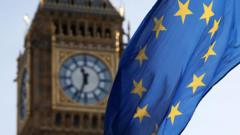In a landmark ruling, the EU's Court of Justice has found that Malta's controversial golden passport scheme is illegal, stating it commercializes the acquisition of nationality. This decision follows legal actions initiated by the European Commission in 2022, with potential consequences for Malta should it fail to amend or repeal the scheme.
Malta's Golden Passport Scheme Deemed Illegal by EU Court

Malta's Golden Passport Scheme Deemed Illegal by EU Court
The EU’s top court has declared Malta's golden passport program, which allows citizenship through investment, violates European law.
Malta's golden passport initiative has been a contentious topic due to its financial requirements: prospective citizens must invest at least €600,000, purchase or lease property, and make a €10,000 donation to charity. The court emphasized that citizenship cannot be treated as a mere financial transaction, thus challenging Malta's interpretation of EU treaties.
The ruling could have serious implications for Malta, especially as former Prime Minister Joseph Muscat defended the program, suggesting that it could persist albeit with modifications. The government has yet to publicly respond to the court's decision but risks incurring significant fines if it does not comply.
Previously, the scheme was suspended for nationals from Russia and Belarus following geopolitical tensions stemming from Russia's invasion of Ukraine. Though an Advocate General previously argued that the EU law does not necessitate a "genuine link" between new citizens and member states, the court ruled that Malta's practices undermine trust across the EU and pose various security risks, including money laundering and tax evasion.
As the EU continues to pressure member states against such citizenship programs, Malta’s future in this regard remains uncertain.
The ruling could have serious implications for Malta, especially as former Prime Minister Joseph Muscat defended the program, suggesting that it could persist albeit with modifications. The government has yet to publicly respond to the court's decision but risks incurring significant fines if it does not comply.
Previously, the scheme was suspended for nationals from Russia and Belarus following geopolitical tensions stemming from Russia's invasion of Ukraine. Though an Advocate General previously argued that the EU law does not necessitate a "genuine link" between new citizens and member states, the court ruled that Malta's practices undermine trust across the EU and pose various security risks, including money laundering and tax evasion.
As the EU continues to pressure member states against such citizenship programs, Malta’s future in this regard remains uncertain.

















